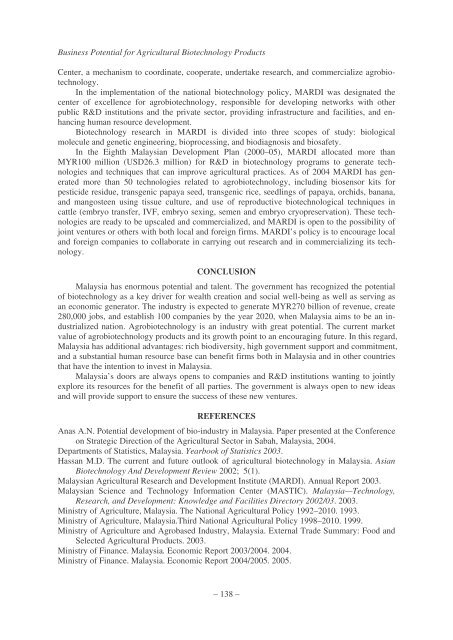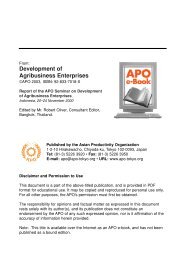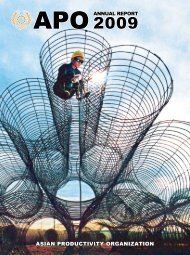Business Potential for Agricultural Biotechnology - Asian Productivity ...
Business Potential for Agricultural Biotechnology - Asian Productivity ...
Business Potential for Agricultural Biotechnology - Asian Productivity ...
You also want an ePaper? Increase the reach of your titles
YUMPU automatically turns print PDFs into web optimized ePapers that Google loves.
<strong>Business</strong> <strong>Potential</strong> <strong>for</strong> <strong>Agricultural</strong> <strong>Biotechnology</strong> Products<br />
Center, a mechanism to coordinate, cooperate, undertake research, and commercialize agrobiotechnology.<br />
In the implementation of the national biotechnology policy, MARDI was designated the<br />
center of excellence <strong>for</strong> agrobiotechnology, responsible <strong>for</strong> developing networks with other<br />
public R&D institutions and the private sector, providing infrastructure and facilities, and enhancing<br />
human resource development.<br />
<strong>Biotechnology</strong> research in MARDI is divided into three scopes of study: biological<br />
molecule and genetic engineering, bioprocessing, and biodiagnosis and biosafety.<br />
In the Eighth Malaysian Development Plan (2000–05), MARDI allocated more than<br />
MYR100 million (USD26.3 million) <strong>for</strong> R&D in biotechnology programs to generate technologies<br />
and techniques that can improve agricultural practices. As of 2004 MARDI has generated<br />
more than 50 technologies related to agrobiotechnology, including biosensor kits <strong>for</strong><br />
pesticide residue, transgenic papaya seed, transgenic rice, seedlings of papaya, orchids, banana,<br />
and mangosteen using tissue culture, and use of reproductive biotechnological techniques in<br />
cattle (embryo transfer, IVF, embryo sexing, semen and embryo cryopreservation). These technologies<br />
are ready to be upscaled and commercialized, and MARDI is open to the possibility of<br />
joint ventures or others with both local and <strong>for</strong>eign firms. MARDI’s policy is to encourage local<br />
and <strong>for</strong>eign companies to collaborate in carrying out research and in commercializing its technology.<br />
CONCLUSION<br />
Malaysia has enormous potential and talent. The government has recognized the potential<br />
of biotechnology as a key driver <strong>for</strong> wealth creation and social well-being as well as serving as<br />
an economic generator. The industry is expected to generate MYR270 billion of revenue, create<br />
280,000 jobs, and establish 100 companies by the year 2020, when Malaysia aims to be an industrialized<br />
nation. Agrobiotechnology is an industry with great potential. The current market<br />
value of agrobiotechnology products and its growth point to an encouraging future. In this regard,<br />
Malaysia has additional advantages: rich biodiversity, high government support and commitment,<br />
and a substantial human resource base can benefit firms both in Malaysia and in other countries<br />
that have the intention to invest in Malaysia.<br />
Malaysia’s doors are always opens to companies and R&D institutions wanting to jointly<br />
explore its resources <strong>for</strong> the benefit of all parties. The government is always open to new ideas<br />
and will provide support to ensure the success of these new ventures.<br />
REFERENCES<br />
Anas A.N. <strong>Potential</strong> development of bio-industry in Malaysia. Paper presented at the Conference<br />
on Strategic Direction of the <strong>Agricultural</strong> Sector in Sabah, Malaysia, 2004.<br />
Departments of Statistics, Malaysia. Yearbook of Statistics 2003.<br />
Hassan M.D. The current and future outlook of agricultural biotechnology in Malaysia. <strong>Asian</strong><br />
<strong>Biotechnology</strong> And Development Review 2002; 5(1).<br />
Malaysian <strong>Agricultural</strong> Research and Development Institute (MARDI). Annual Report 2003.<br />
Malaysian Science and Technology In<strong>for</strong>mation Center (MASTIC). Malaysia—Technology,<br />
Research, and Development: Knowledge and Facilities Directory 2002/03. 2003.<br />
Ministry of Agriculture, Malaysia. The National <strong>Agricultural</strong> Policy 1992–2010. 1993.<br />
Ministry of Agriculture, Malaysia.Third National <strong>Agricultural</strong> Policy 1998–2010. 1999.<br />
Ministry of Agriculture and Agrobased Industry, Malaysia. External Trade Summary: Food and<br />
Selected <strong>Agricultural</strong> Products. 2003.<br />
Ministry of Finance. Malaysia. Economic Report 2003/2004. 2004.<br />
Ministry of Finance. Malaysia. Economic Report 2004/2005. 2005.<br />
– 138 –
















